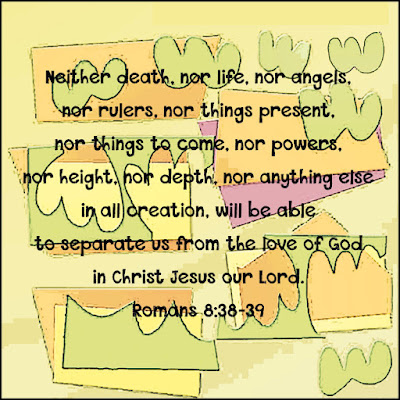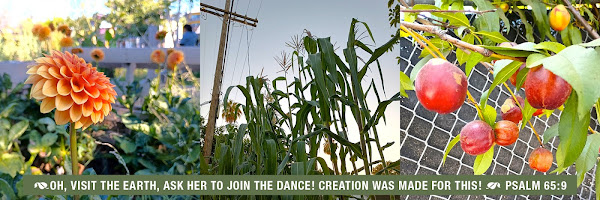nor rulers, nor things present,
nor things to come, nor powers,
nor height, nor depth, nor anything else
in all creation, will be able
to separate us from the love of God
in Christ Jesus our Lord."
Romans 8:38-39
Romans 8:26-39
26 Likewise the Spirit helps us in our weakness; for we do not know how to pray as we ought, but that very Spirit intercedes with sighs too deep for words. 27 And God, who searches the heart, knows what is the mind of the Spirit, because the Spirit intercedes for the saints according to the will of God.
28 We know that all things work together for good for those who love God, who are called according to his purpose. 29 For those whom he foreknew he also predestined to be conformed to the image of his Son, in order that he might be the firstborn within a large family. 30 And those whom he predestined he also called; and those whom he called he also justified; and those whom he justified he also glorified.
31 What then are we to say about these things? If God is for us, who is against us? 32 He who did not withhold his own Son, but gave him up for all of us, will he not with him also give us everything else? 33 Who will bring any charge against God's elect? It is God who justifies. 34 Who is to condemn? It is Christ Jesus, who died, yes, who was raised, who is at the right hand of God, who indeed intercedes for us. 35 Who will separate us from the love of Christ? Will hardship, or distress, or persecution, or famine, or nakedness, or peril, or sword?
36 As it is written, "For your sake we are being killed all day long; we are accounted as sheep to be slaughtered." 37 No, in all these things we are more than conquerors through him who loved us. 38 For I am convinced that neither death, nor life, nor angels, nor rulers, nor things present, nor things to come, nor powers, 39 nor height, nor depth, nor anything else in all creation, will be able to separate us from the love of God in Christ Jesus our Lord.
Reviewing
Romans is the seventh and the latest of Paul's undisputed epistles. "Undisputed" means they carry strong evidence of his authorship (grammar, sentence structure, syntax, vocabulary), although all of these letters probably garnered edits and additions as they circulated round-robin style to various churches. We sometimes refer to Romans as Paul's systematic theology. Systematics is the philosophical-style theology that presents ideas about God with definitions, outlines, logic, and structure. By standards of people like Augustine and Barth, Romans isn't particularly systematic, but it still gives us Paul's mature, well-developed theology. More than one person has observed if Paul wrote only Romans 8, he'd forever be remembered as a high level theologian.
Today in the Church's Year of Grace
Although I wrote about Jacob last week, six years ago I blogged about Romans 8:12-25 and referred to the "interwoven interdependence" of humans and the rest of creation. That was long before Covid, and rather than attempting a semi-coherent weekly essay, I copied the notes I used for teaching and inserted any interesting class discussion material I remembered.
In today's second reading we hear about the constant presence of the Trinity in our lives, especially in our prayer lives—especially the Holy Spirit. This scripture is packed full of profound Trinitarian theology. You can discover reliable commentaries and helpful devotionals that relate well to it, yet we can take much of it at plain "what you see is what you get" face value. However, because of the famous and well-known words in this passage we need to listen and hear very carefully.
Where We Live
This Sunday we hear God's promise we will be formed into the image of Jesus Christ; according to the section immediately before this one (18-25), all creation waits and hopes for humans to act more fully in our in-God-created imago dei (image of God): "interwoven interdependence!" Verse 23 says we humans wait for adoption. In a logical continuation from earlier in Romans, our baptism into Jesus' death and resurrection births us as Jesus' sisters and brothers, offspring of God. Paul's most famous baptismal essay is in Romans 6:1-11.
Verse 29 assures us Jesus is firstborn of many siblings in "a large family" that includes each of us. At the start of this epistle, Romans 1:4 says God appointed Jesus son of God at his resurrection, but please note carefully, this is not the heresy of adoptionism.
On desert spirit's fire, the long-running blog I started mid-July 2002, I've written about home and homecoming at least one hundred times—and counting. I can't imagine any individual feeling totally "at home" absolutely everywhere and with everyone, but the simple head knowledge of our relatedness in Jesus Christ can help take the edge off at least some strangeness and alienation.
On several occasions I've mentioned checking into a summer hostel in Lübeck, Germany long ago. While the only other person in the room and I got to talking, she told me about the incredible confidence and freedom she lived with because her parents chose her in adoption. We live with that same confidence and freedom because God chooses us, elects us, adopts us in Jesus Christ.




